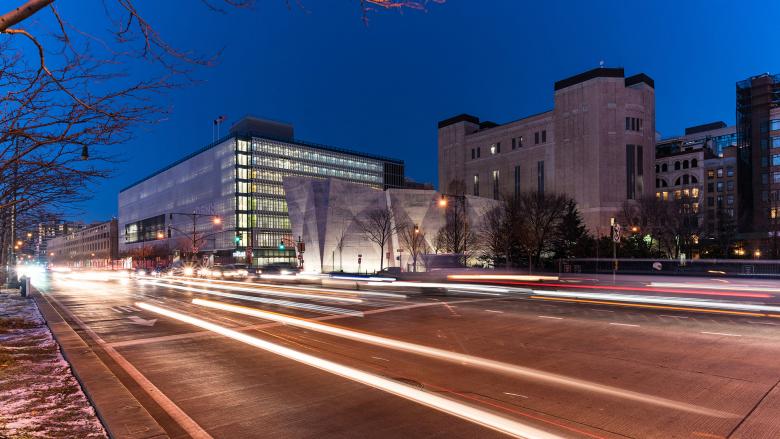Spring Street Salt Shed
Dattner Architects and WXY architecture + urban design were hired to design two buildings on Manhattan's West Side for the New York City Department of Sanitation: a Sanitation Garage and a Salt Shed. The latter, though far more diminutive in size, is the more striking of the two, thanks to a crystalline form and an exposed concrete exterior – a rarity in New York City. Dattner Architects answered a few questions about the recently completed Salt Shed.
What were the circumstances of receiving the commission for this project?
We were selected to design the Garage and Salt Shed through an open RFP process that encouraged design excellence. Dattner Architects and WXY architecture + urban design teamed together because of a shared commitment to bring design excellence to public projects and a passion for New York City.
Please provide an overview of the project.
The Spring Street Salt Shed is the sister project to the Manhattan Districts 1/2/5 Garage, completed at the same time on the adjacent site. The projects were commissioned by NYC Department of Sanitation, who now operates them. They are also a part of the NYC Department of Design & Construction’s portfolio of public projects.
What are the main ideas and inspirations influencing the design of the building?
The building form was inspired by the strong geometry of a salt crystal.
How does the design respond to the unique qualities of the site?
The building sits on a prominent site, along the west side of Manhattan – visible from the water, from Hudson River Park and from the heavily trafficked West Street. Behind it is a historic piece of heroic civic infrastructure – the vent shaft for the Holland Tunnel. The much smaller Salt Shed holds its own on the site. Its strong, sculptural form, honest materials, and dramatic lighting accept the urban fabric.
How did the project change between the initial design stage and the completion of the building?
The building design went through a number of iterations. Originally the program was housed within the garage. When it was moved to the southern site, it allowed for a freedom of expression, and the collaboration between the design architects, the clients, and even the Public Design Commission allowed for an exploration of a series of forms. In the end, the building was designed to be a counter point to the long rectilinear form of the garage, with its scrim-like façade. The salt shed is a sculptural object, elemental, and somehow raw and precious at the same time. The building was constructed as designed.
Was the project influenced by any trends in energy-conservation, construction, or design?
Architectural Concrete with a crystalline waterproofing admixture was used as both the structure and final finish of the building, contributing to the use of fewer materials and providing a robust and lasting envelope to stand up to the corrosive nature of the program over the life of the building.
Email interview conducted by John Hill.
Location Plan
West Street Elevation with Garage
Canal Street Elevation
Spring Street Salt Shed
2015New York City
Client
New York City Department of Sanitation, NYC Department of Design & Construction
Architects
Dattner Architects with WXY architecture + urban design
New York, NY
Architect
Dattner Architects
Principal in Charge
Paul Bauer AIA
Principal
Richard Dattner FAIA
Project Manager
Gia Mainiero AIA
Project Team
Ruth Dresdner AIA, Daniella LaRocca AIA, Matthew Thomas RA, Eugene Kwak LEED AP
Associate Architect
WXY architecture + urban design
Principals in Charge
Claire Weisz FAIA, Mark Yoes AIA LEED AP
Project Team
Christopher Kupski AIA
Structural Engineer
Burns Group
MEP/FP Engineer
Greeley and Hanson
Landscape Architect
Abel Bainnson Butz
Lighting Designer
Domingo Gonzalez Associates
Interior Designer
Dattner Architects in association with WXY Architecture + Urban Design
Contractor
Oliveira Contracting
Construction Manager
Turner
Architectural Concrete Consultant
Reginald Hough Associates
Site Area
14,575 sf
Building Area
7,500 sf












